 Petzlover
Petzlover East Siberian Laika is originated from Russia but Kai Ken is originated from Japan. East Siberian Laika may grow 10 cm / 4 inches higher than Kai Ken. Both East Siberian Laika and Kai Ken are having almost same weight. Both East Siberian Laika and Kai Ken has almost same life span. East Siberian Laika may have more litter size than Kai Ken. Both East Siberian Laika and Kai Ken requires Moderate Maintenance.
East Siberian Laika is originated from Russia but Kai Ken is originated from Japan. East Siberian Laika may grow 10 cm / 4 inches higher than Kai Ken. Both East Siberian Laika and Kai Ken are having almost same weight. Both East Siberian Laika and Kai Ken has almost same life span. East Siberian Laika may have more litter size than Kai Ken. Both East Siberian Laika and Kai Ken requires Moderate Maintenance.
 The East Siberian Laika Is a Russian dog developed for hunting in Siberia. The breed is a spitz type and good hunting large or small prey. It hunted squirrels and grouse as well as moose, mountain lions and bears. In the cold, snowy Siberia it was also a sled dog. There are four types of Russian Laikas: the West Siberian Laika, the Karelo-Finnish Laika, the East Siberian Laika and the Russo-European Laika.
The East Siberian Laika Is a Russian dog developed for hunting in Siberia. The breed is a spitz type and good hunting large or small prey. It hunted squirrels and grouse as well as moose, mountain lions and bears. In the cold, snowy Siberia it was also a sled dog. There are four types of Russian Laikas: the West Siberian Laika, the Karelo-Finnish Laika, the East Siberian Laika and the Russo-European Laika.
Dog from the Evenki National Territory, the Lake Baikal region, the Maritime Territory, the Irkutsk Province, and the Amur River basin were the breeding groups from which the East Siberian Laika developed. In 1947 the East Siberian Laika was designated as a separate breed from the other Laikas. All 4 Laikas were registered as separate breeds at the All -Union Cynological Congress. Biologist K.G. Abramov is credited with developing the first standard for the breed.
The breed is recognized by the American Canine Association, Inc (ACA), the Dog Registry of America (DRA) as well as the FCI. They are not recognized by the UKC or the AKC. Only the government breeds the East Siberian Laika in Russia.
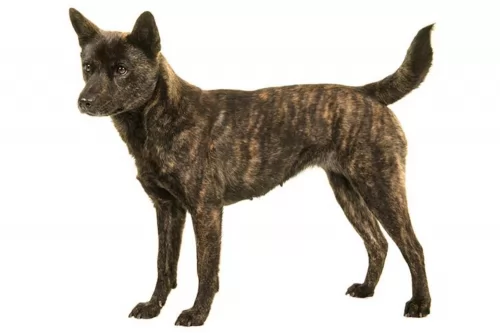 The Kai Ken dog hails from Japan and is both an ancient and rare dog. In fact the dog was discovered in 1929 in the Kai province near Mount Fuji. The dog has the nickname Tora Inu in Japan which means 'Tiger Dog'. Maybe its got to do with the brindle striped coat or his bravery.
The Kai Ken dog hails from Japan and is both an ancient and rare dog. In fact the dog was discovered in 1929 in the Kai province near Mount Fuji. The dog has the nickname Tora Inu in Japan which means 'Tiger Dog'. Maybe its got to do with the brindle striped coat or his bravery.
He falls into the working class category. In 1931, the Kai Ken Aigokai registry was formed to preserve the dog. In fact in this year Dasuke Adachi discovered these dogs and in 1934 was actually designated a Natural Monument in Japan and also protected by law.
The Kai Ken was recognized in 1934 by the Japanese Kennel Club. It is not 100% certain but it is thought that the dog was brought to the United States in the 1950s.
 Within the East Siberian Laika there are several different types, but two important ones are the Evenki and Irkutsk. Of all the Laikas, the East Siberian is the most diverse in physique and in color. It is a rangy dog, heavy boned and proportionately appears square. It has triangular, erect ears and a tail that curves over his back. The shape of his head can vary within the regions and the types.
Within the East Siberian Laika there are several different types, but two important ones are the Evenki and Irkutsk. Of all the Laikas, the East Siberian is the most diverse in physique and in color. It is a rangy dog, heavy boned and proportionately appears square. It has triangular, erect ears and a tail that curves over his back. The shape of his head can vary within the regions and the types.
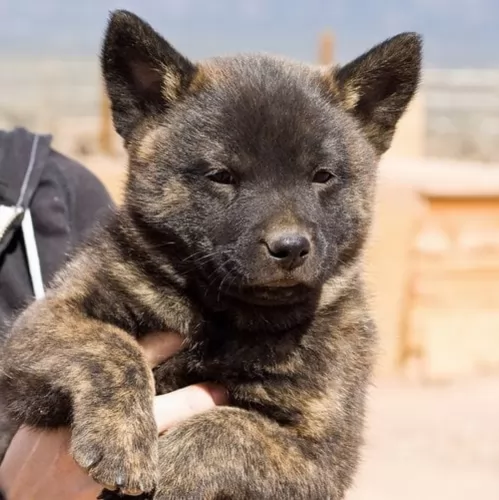 The Kai Ken has always been used for hunting purposes. He comes as recommended for hunting people and those who are active.
The Kai Ken has always been used for hunting purposes. He comes as recommended for hunting people and those who are active.
It is a medium sized dog standing at between 43 to 56cm in height both male and female and weighing between 14 and 22kg.
The ears of the dog are erect, the muzzle is fairly tapered and the nose is black. The tail is bushy like that of a fox and curls over the back. The double coat of the dog is of medium length and harsh and is a brindle color in a reddish or black shade.
Puppies are born black and then the brindle stripe-like pattern comes in later. He has an athletic body and is a keen swimmer.
The Kai Ken is an intelligent dog, loyal to his human family while being somewhat reserved around strangers. They are amicable with both children in the home as well as other pets.
He is a friendly, intelligent dog, forming close bonds with his family. Have him trained and socialized and he'll make you a splendid pet who will be willing to guard you if anyone threatens.
One look at that bright face and you can see that he is an intelligent, independent dog. He is also courageous and fearless and makes a great watchdog, especially because he is naturally reserved and suspicious with strangers.
 The East Siberian Laika is bred to hunt and hunt large prey as well as small. For this reason, he usually doesn’t get along well with other dogs or other large predators. Other wise he is a calm; well-mannered dog and he can be a very good watch dog. They are very trainable and make great companion dogs.
The East Siberian Laika is bred to hunt and hunt large prey as well as small. For this reason, he usually doesn’t get along well with other dogs or other large predators. Other wise he is a calm; well-mannered dog and he can be a very good watch dog. They are very trainable and make great companion dogs.
The East Siberian Laika is the calmest and quietest of the four Russian Laikas. They are very affectionate and loyal to their families. They love to walk, jog, hike, run or camp with their family.
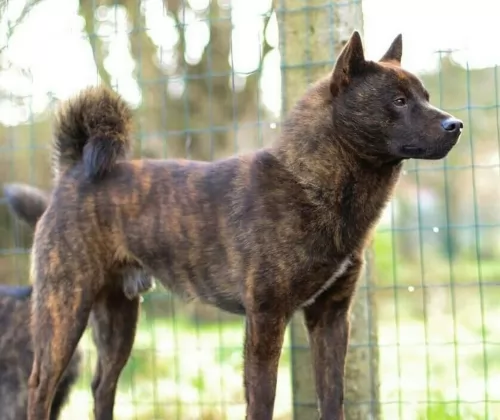 The Kai Ken is a working- and hunting dog, so he is used to being active and will want a home where he can be played with and exercised regularly.
The Kai Ken is a working- and hunting dog, so he is used to being active and will want a home where he can be played with and exercised regularly.
He can be slightly stubborn and independent so training and socialization are imperative. This is also because the dog’s curiosity and his athletic skills can lead to trouble if he isn’t properly trained.
Treat him the way he deserves and you’ll see that he is able to develop a strong bond with you and be altogether an excellent family pet.
 Besides injures related to hunting, the East Siberian Laika is prone to several other conditions including dysplasia and:
Besides injures related to hunting, the East Siberian Laika is prone to several other conditions including dysplasia and:
The contents of the dog’s abdomen come through the abdominal wall at the umbilicas. They are surgically repaired.
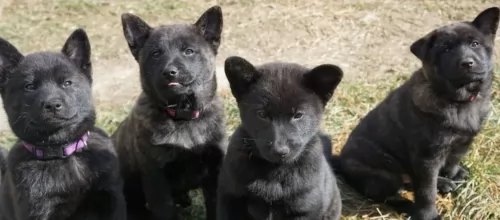 With a lifespan of 14 to 16 years, and given the genetic purity of the Kai Ken, you aren't likely to battle with congenital health problems with your dog, but it is always good to be aware of certain minor health issues that he could succumb to.
With a lifespan of 14 to 16 years, and given the genetic purity of the Kai Ken, you aren't likely to battle with congenital health problems with your dog, but it is always good to be aware of certain minor health issues that he could succumb to.
He can suffer from a few common dog diseases such as progressive retinal atrophy or hip dysplasia.
This is a disease of the eye where there is wasting of certain parts, and in this case the cells of the retina develop abnormally. This can eventually lead to blindness. It’s an inherited disease that can occur in pure- and mixed breeds, and dogs with PRA shouldn’t be used for breeding.
It isn’t a painful condition, and the first symptom usually noticed in a dog is night blindness where you may notice him bumping into things at night and being reluctant to walk around in the dark.
 This is an active, working dog and should be fed accordingly. Probably 1.5-2 cups of high quality dry dog food, two times a day.
This is an active, working dog and should be fed accordingly. Probably 1.5-2 cups of high quality dry dog food, two times a day.
The East Siberian Laika is an ancient breed and fairly healthy though prone to dysplasia:
The hip socket is not formed correctly, and the bone cannot fit properly causing lameness and/or arthritis.
Primary lesions and cartilage surrounding the elbow join and resulting in osteopathic injuries.
Again, this is a working dog. They need at least a half hour of moderate/vigorous exercise every day. A fenced in ran is a plus. You will also need to play with him to keep him from getting bored. Catch, flyball, or agility would all suit this breed well.
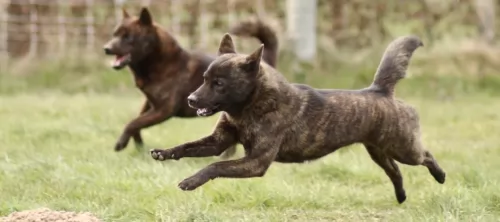 Even though the coat is thick, the Kai Ken will require basic canine care, so a brush twice a week will be enough to keep the coat free of loose hair. He sheds more heavily a couple of times a year and then he will require more brushing.
Even though the coat is thick, the Kai Ken will require basic canine care, so a brush twice a week will be enough to keep the coat free of loose hair. He sheds more heavily a couple of times a year and then he will require more brushing.
He has always been used to hunt so he is a dog that will require regular exercise such as walks, hikes, swimming and ball games.
The nails of the dog should be trimmed regularly once they become long as long nails can be hazardous and can hook onto things, causing injury to the nail area.
The ears of the dog should be checked regularly for fleas and ticks, and teeth should also be brushed with canine toothbrush and toothpaste.